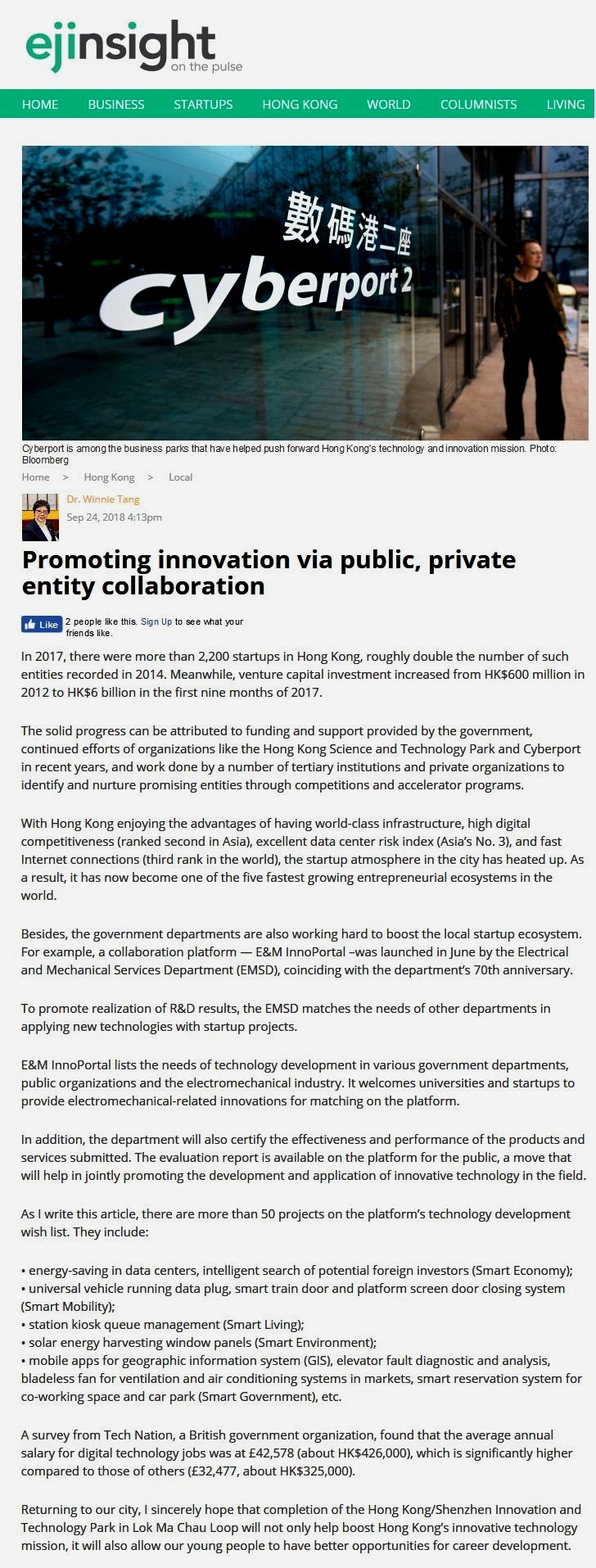網上版請按此

Promoting innovation via public, private entity collaboration
In 2017, there were more than 2,200 startups in Hong Kong, roughly double the number of such entities recorded in 2014. Meanwhile, venture capital investment increased from HK$600 million in 2012 to HK$6 billion in the first nine months of 2017.
The solid progress can be attributed to funding and support provided by the government, continued efforts of organizations like the Hong Kong Science and Technology Park and Cyberport in recent years, and work done by a number of tertiary institutions and private organizations to identify and nurture promising entities through competitions and accelerator programs.
With Hong Kong enjoying the advantages of having world-class infrastructure, high digital competitiveness (ranked second in Asia), excellent data center risk index (Asia's No. 3), and fast Internet connections (third rank in the world), the startup atmosphere in the city has heated up. As a result, it has now become one of the five fastest growing entrepreneurial ecosystems in the world.
Besides, the government departments are also working hard to boost the local startup ecosystem. For example, a collaboration platform — E&M InnoPortal –was launched in June by the Electrical and Mechanical Services Department (EMSD), coinciding with the department's 70th anniversary.
To promote realization of R&D results, the EMSD matches the needs of other departments in applying new technologies with startup projects.
E&M InnoPortal lists the needs of technology development in various government departments, public organizations and the electromechanical industry. It welcomes universities and startups to provide electromechanical-related innovations for matching on the platform.
In addition, the department will also certify the effectiveness and performance of the products and services submitted. The evaluation report is available on the platform for the public, a move that will help in jointly promoting the development and application of innovative technology in the field.
As I write this article, there are more than 50 projects on the platform's technology development wish list. They include:
• energy-saving in data centers, intelligent search of potential foreign investors (Smart Economy);
• universal vehicle running data plug, smart train door and platform screen door closing system (Smart Mobility);
• station kiosk queue management (Smart Living);
• solar energy harvesting window panels (Smart Environment);
• mobile apps for geographic information system (GIS), elevator fault diagnostic and analysis, bladeless fan for ventilation and air conditioning systems in markets, smart reservation system for co-working space and car park (Smart Government), etc.
A survey from Tech Nation, a British government organization, found that the average annual salary for digital technology jobs was at £42,578 (about HK$426,000), which is significantly higher compared to those of others (£32,477, about HK$325,000).
Returning to our city, I sincerely hope that completion of the Hong Kong/Shenzhen Innovation and Technology Park in Lok Ma Chau Loop will not only help boost Hong Kong's innovative technology mission, it will also allow our young people to have better opportunities for career development.
Dr. Winnie Tang
Honorary Professor, Department of Computer Science, The University of Hong Kong